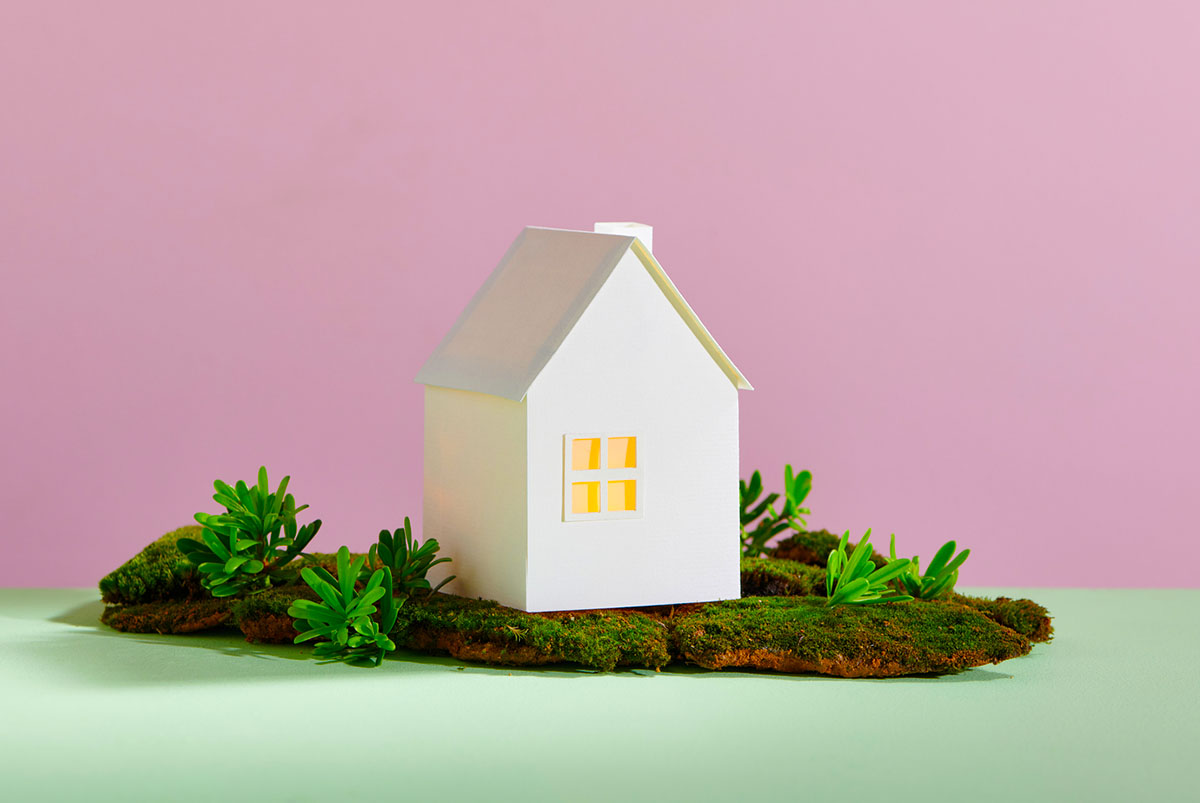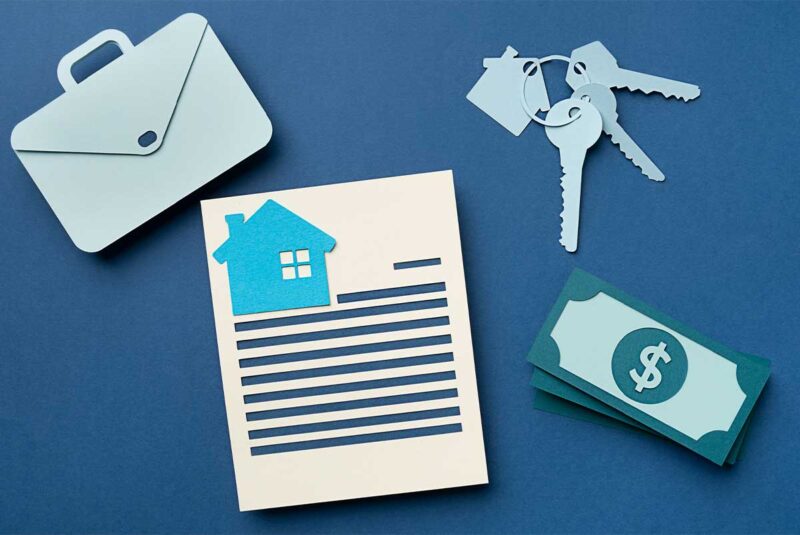Ready To Buy a Home?
Get Approved to Buy a Home
Rocket Mortgage® lets you get to house hunting sooner.
Buying a home can be complicated when the house has already been built. Buying land with the intent to build on top of it is an even longer process.
No need to stress. In this guide, we’ll walk you through seven straightforward steps for how to buy land and build a house. We’ll cover the different financing options available to you and then discuss the pros and cons of getting a home this way. Hopefully by the end, you’ll be able to decide if you’re interested in the process or if another type of property would be a better option.
How To Buy Land and Build a House in 7 Steps
These steps will give you a good overview of all that goes into buying land and building a home. Keep in mind you don’t need to follow these steps in order, and you may even be able to skip certain aspects. For example, you don’t need to worry about financing options if you plan to purchase the land and pay for the construction with cash.
Need Mortgage Help?
New home, second home, refinancing, we’ve seen it all. Whatever your goals, expert help is just a click away.
1. Decide where you want to buy and build
The first thing you need to do is decide what area you want to be in. Where would you like to buy land and later construct your home? There are several important factors to consider when making this decision.
Set your budget
How much are you able to pay for this project? How much of a down payment do you have saved up? Setting a budget will help you filter what areas to look in. You’ll need enough to not only purchase the land but also to build the home. Here are some expenses to keep in mind:
- Land purchase costs: This is how much you’ll spend on just the land. Depending on how much land you purchase and the location, this can cost just as much if not more than the home construction.
- Construction costs: This is how much you’ll spend to build the home, including things like materials, permits, labor and so on.
- Financing costs: If you use financing, you’ll be responsible for a down payment and closing costs, and you’ll also pay interest on the loan with your monthly payment. There may also be additional costs like private mortgage insurance (PMI), depending on your loan terms.
- Utilities and infrastructure costs: These costs include installing electricity, getting hooked up to the municipal water and sewage system, installing a well, cable and internet, etc.
Consider zoning laws and restrictions
Before you start picturing your dream home on a plot of land, it’s important to consider the local zoning laws and restrictions. There could be restrictions on the size or type of the building, as well as other restrictions like how close construction can be to the property line or any additional environmental considerations.
You don’t want to invest all of your capital into a plot of land only to find out that the construction you had planned would violate these regulations.
Consider what daily life will look like
What type of internet is available to be installed where the property is located? Will you be able to connect to city water and sewage, or will you need to install a well? If you have strong preferences regarding your utilities and infrastructure, it’s important to find out what options are available before committing to a purchase.
If you know that you aren’t willing to consider installing a septic system and a well, that will narrow your search to areas that have the option to connect to the local municipal water system.
2. Consider how you’ll pay for the land and construction
Even if you don’t have the cash on hand to pay for the land purchase and construction, there are several different financing options available. But a word of warning: you might have to search a bit to find lenders willing to offer some of these loan types.
Construction Loan
Construction loans are short-term loans that cover the costs of building a home. Instead of delivering the funds in a lump sum, lenders give the money in stages as the home is being constructed.
Construction loans can be structured in such a way as to also allow the borrower to purchase the land the home will be constructed on.
Construction loans can be a good option but may be hard to find because of the risk and complexity associated with them.
Land loan
Land loans are a financing option specifically focused on land purchases, hence the name. Usually, when a borrower uses this type of loan, they’ll combine it with a different type of financing to actually build the home, or use cash.
At this time, our affiliate partner Rocket does not offer land loans, however, they can help you refinance an existing land loan into a traditional mortgage once the home has been constructed.
U.S. Department of Agriculture (USDA) loan
If you plan to purchase land in a rural area and use it as your primary residence a USDA loan could be a good option for you. With a USDA construction loan, you can use one loan to purchase the land and construct the house. Once the house has been built, the loan effectively transitions into a permanent mortgage with a fixed rate.
Keep in mind that there are specific location and income requirements you’ll need to meet in order to be considered for a USDA loan.
Land contract
Land contracts are a type of seller financing. Essentially, instead of taking out a loan from a traditional lender, the buyer takes out a loan from the seller and agrees to pay it back over time.
There are some risks associated with this type of arrangement. These loans often come with a balloon payment due at the end of the loan term as well as higher interest rates.
However, if you’re able to work out an agreement with the seller, this can be a good option for those who might struggle to find other types of financing.
Get approved to buy a home.
Rocket Mortgage® lets you get to house hunting sooner.
3. Assemble your team
Depending on your circumstances, you might not need all of these professionals in your corner – some of the professionals you work with could fill multiple roles. However, if you’re a first-time home buyer, we absolutely recommend having someone you can trust to help you with all of these aspects.
- Real estate agent: It’s hard to overstate how beneficial a good real estate agent can be. They will help you with everything from finding the property to negotiating the price. They may even be able to help find contractors to build your dream home.
- Mortgage lender: You’ll need to track down a lender who offers the types of financing that are best for you. Once you do, it’s still worth taking the time to talk to multiple lenders and ask them questions so that you can be sure they’re the best fit for your needs.
- Architects and designers: Simply put, unless you’re an architect yourself, you’ll need someone else to draw up the blueprints for the home. This is where the architect or designer comes in. Sometimes the same person who draws up the plans will do the construction, but not always.
- Contractors and builders: This is the team that actually brings the plans to life. They follow the blueprints and handle the actual construction of the home. (They’re usually the ones with hard hats and power tools.)
You don’t have to assemble the whole team at the beginning of the process. Some people prefer to hire an architect and contractor after they’ve already purchased the land. However, if you hire them at the beginning, you allow them to offer their opinion on the land you purchase, which can also be advantageous given their experience and expertise in building homes.
4. Find the right property
Once you know where you want to look and how you’re going to pay for it, you’re ready to go land hunting. This is where leaning on a team of professionals can really help because there are so many different factors to consider here. Below are a few of the most important ones:
- Investment potential: Do knowledgeable professionals expect this land to increase in value over time? Is it a good investment?
- Land condition: What condition is the land in? Is it suitable to build on? What are the potential construction risk factors you’ll need to be aware of based on the land itself?
- Proximity to other needs: How far is the nearest grocery store? What entertainment is nearby? How are the schools? These are all important questions to ponder before committing to a property purchase.
- Special environmental considerations: Are there unique environmental considerations you need to be aware of? For example, is there a protected species common to the area?
- Zoning laws: Can you build the type of home you want to build to the size you’d like to build it?
Finally, if you’re really serious about a piece of land, you should probably get it surveyed. This will tell you definitively where the boundaries of the land begin and end.
While it’s possible to buy an existing house online, if you plan to buy land and build on top of it, we highly recommend visiting the property in person and getting as many professional opinions as possible before committing. It’s one thing to buy an already-constructed house, it’s another to oversee the construction yourself.
5. Make an offer and negotiate
Once you’ve found the right piece of land, you’re ready to make an offer. This is where a real estate agent can advise you on how to make your offer as competitive as you can make it, ideally without overpaying.
They can also help you with the negotiation process if the seller doesn’t accept your offer outright. There are many different potential negotiation points from the purchase price to seller concessions to the time to close.
6. Close on the property
After the seller accepts your offer, you’re ready to move into closing. At a high level, this process will be the same as for other real estate transactions. Some of the steps are also the same:
- Title search: Conducting a title search reveals if anyone other than the seller has a claim to the property, or if there are any encumbrances (like unpaid property taxes).
- Appraisal: Depending on your lender and the type of financing, an appraisal could be requested to determine the fair market value of the land.
- Insurance requirements: You might be required to obtain land insurance. Even if your lender doesn’t require it, it’s something worth looking into.
- Closing costs: These are the costs associated with closing on the loan. They generally include the steps listed above, as well as fees from the lender and the cost of any mortgage points purchased.
7. Begin the construction process
Once the land is officially yours, you’re able to begin the process of breaking ground and seeing your new home come to life.
If you haven’t done so already, now is the time to assemble the professionals who will actually handle building your home. Think of contractors like electricians, plumbers and so on. There are also general contractors who may be able to help you with multiple aspects of the home’s construction.
Another advantage of relying on professionals is that they’ll be able to advise you on the types of permits that you need to apply for and when you need to do it. Take the time to ensure that everything is done according to code and is permitted, as this can significantly affect the potential resale value.
Pros and Cons of Buying Land To Build a House
Now that we’ve gone over the process of buying land to build a house, it’s worth taking a step back to consider the big picture. We’ve compiled a list of the advantages and disadvantages so that you can decide if it’s the best choice given your circumstances.
PROS of buying land to build a house👍
One of the best parts of building a home is that you can build it to your liking. The number of bedrooms, the kitchen layout, wall colors – all of that will be up to you (and your budget).
Generally speaking, purchasing land and constructing your home gives you the option for more space and privacy.
Taking on the risk of building a home on undeveloped land can accelerate the appreciation of that property value, leading to a greater return on investment down the road and more equity for you.
CONS of buying land to build a house👎
Even if everything goes perfectly to plan, you’re looking at months (if not years) to build a home. That means that you’ll need someplace to live in the meantime, which could mean the additional expense of renting. If you’re looking to move into your new home quickly, then this is probably not the right option.
Things can go wrong when building a home, and budgets don’t always stretch as far as anticipated. Remember that the actual cost of constructing the home can be considerably more than was agreed upon in the planning stages.
Not all lenders offer financing options like construction loans or land loans. If you’re interested in those options, you might have to do more legwork to find a lender willing to offer them. It might mean going with someone local, who knows the area well, rather than a national, established brand.
Final Thoughts on Buying Land To Build a House
Working through these seven steps for how to buy land to build a house will give you a good idea of the types of costs and risks that come with the process. On the one hand, you have greater customization options and you could get a great value for the investment. On the other, the timeline and costs can be unpredictable, and you could have a hard time finding financing.
If that seems like too much uncertainty, a new construction home allows you to purchase a home that hasn’t been lived in before without taking on the hassle of building it for yourself. You can also finance it with a traditional mortgage.
The Short Version
- First, you’ll want to decide where to buy land and build. You should look at factors like your budget, zoning laws and availability of different utilities
- There are several financing options you can search for, including construction loans, land loans, USDA loans, HELOCs and potentially seller financing
- Pros of buying land to build on include the ability to customize, more privacy and space and the possibility of a great return on your investment




